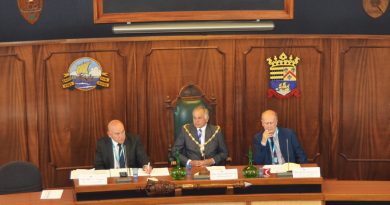Fostering relationship between child and carer
Gosport foster carer ‘Jane’ – not her real name – told Chief Correspondent Rob Thomas that she wishes she had started fostering years ago …
CARING for two young boys who are not their own children has had its challenges for Jane and her husband but they have no regrets about the decision they made to open their home to the siblings fifteen months ago.
Having stopped working and with her own, grown-up children no longer at home, Jane, “felt we could give something back” – in the case of her and her husband, that was by fostering.
As she said: “We have always been family orientated. We have the skill set from bringing up our own children and we have the space.”
And Jane and her husband would have applied, “years ago”, but “we were under the false impression that if you are working you cannot foster – but you can.”
In Hampshire, fostering is the responsibility of the county council which operates its own fostering service and there are also Independent Fostering Agencies – more often than not they are for-profit private companies or sometimes voluntary sector organisations – that work with the local authority to provide foster care to children and young people.
There are currently 99 foster carers in Gosport and Fareham – 46 in Fareham, 53 in Gosport – registered with either the county council or an IFA, and 167 children in placements – 70 in Fareham, 97 in Gosport.
Application process can take six months but that includes training
Jane applied to the county council scheme – rated as ‘outstanding’ by OFSTED – which offers potential foster carers options of the age of the child or children they foster and whether the arrangement is for ‘respite’ periods, or for the short-term or long-term.
The county council’s website makes it clear that the application process takes an average of four to six months because as well as interviews and training, there are police and employment reference checks plus a full medical.
In Jane’s case, it was six months though throughout she said there was support from a social worker who phoned every week, did most of the form-filling, and interviewed other family members – “quite full-on but not too arduous,” was how she described it.
Opting for younger children and a short-term arrangement due to their age, Jane and her husband were allocated their first foster children.
“Initially, they don’t understand why they are in our home,” Jane said. “But once they realise they are in a stable, loving environment, they soon settle. It is amazing how quickly they adapt.”
Though it has not been plain sailing: “It’s had its challenges but it’s nothing we have not been able to cope with and experienced with our own children.”
‘foster carers are not on their own’
And support is on hand in the form of visits and virtual meetings by social workers – one for the children and another for Jane and her husband – plus the local Hampshire Hive which brings together foster families in the area and has a support worker so that it forms a ‘bubble’ of experience and help.
Jane is very complimentary about the Gosport Hive because, “there is always someone there with the experience and you can reach out to any time.”
Respite care – with the foster children going to another family for a short time such as a weekend or for a week’s holiday – is organised by the county council and Jane has a designated respite carer but should they not be available, one of the local Hive families, “will be available”, and it works because, “all of the children and the adults know each other.”
Caring for foster children who are ultimately the responsibility of the county council means having to complete some forms such as the six-monthly plan but, again, Jane said it is, “not too onerous”.
A log is kept of any incidents such as accidents and, if the incident is serious, as well as the designated social worker there is an out-of-hours helpline.
Jane and her husband also keep a diary with photos and a memory box for the children so that, “when they do move on they will have a record of their time here.”
Allowances and skill levels
In the county council scheme, foster carers receive allowances for the day-to-day costs of looking after each child, and there are additional payments for particular events such as birthdays and Christmas. The rates paid are those recommended by the charity The Fostering Network.
Carers can receive additional payments based on their skill level which is decided via an appraisal process and training courses are offered so carers can move through the three skills levels identified by the county council.
There was little doubt in Jane’s mind when asked whether she would recommend fostering to other people – her answer was: “Definitely. We should have done it years ago.”
But she recommends that anyone contemplating becoming a carer should, “talk to people who are fostering because there are a lot of myths about fostering.”
To find out more about being a Hampshire County Council foster carer there is a dedicated website – and has a straightforward initial application form – or telephone 01489 587052 for an informal chat.
As stated in this report, there are also Independent Fostering Agencies which can have different allowances and support systems.
The Globe’s interview with Jane was arranged as part of Hampshire County Council’s support for Foster Care Fortnight, The Fostering Network’s, “annual campaign to raise the profile of fostering and show how foster care transforms lives.”
Image (top): Fostering Hampshire Children Information Pack front cover. Hampshire County Council




